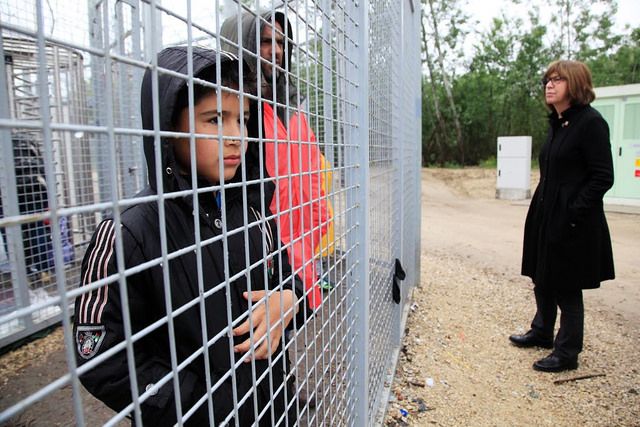BERLIN—The integrity of the European Union was shaken to its core over the past year when some 1.5 million refugees and migrants crossed its borders in the hopes of making a new home in Europe.
One solution to put Europe back on track (I’m paraphrasing the words of the Slovak Prime Minister): more Frontex.
As an American, I had heard very little of Frontex, its name reminiscent of some kind of evil private firm from an apocalyptic fantasy film. Turns out, the E.U. has its very own border patrol agency, Frontex, and it’s been “promoting, coordinating and developing European border management” since 2004.
So what exactly does that mean in today’s Europe? In practice, Frontex often fills in the gaps on the front lines of the refugee crisis. For example, in Greece, Frontex is helping to register new arrivals and to deport some of them back to Turkey. Its ships go on patrols with the Greek Coast Guard. Frontex aids Bulgaria in monitoring its borders with non-E.U. states.
Earlier this month, in a conference held rather symbolically on Bulgaria’s border with Turkey, the E.U. announced Frontex’s official rebrand. Its new name, the more banal sounding European Border and Coast Guard Agency, has more funding and expanded powers, including its own staff so it doesn’t always have to beg E.U. countries to provide guards to fill its ranks. If an E.U. country is failing to properly maintain its border — and this of course would have an effect on the rest of the E.U. — then Frontex can intervene more quickly to put things back in order. Or at least that’s the idea.
The purpose of all of this, according to Europe’s leaders, is that Europe’s internal borders can be open if Europe’s external border is better guarded.
“Fortunately, we have given up border controls between the member states of the Schengen area, to guarantee free movement of people, a unique symbol of European integration,” said European Commission President Jean-Claude Juncker in a speech about one year ago, just before he called to strengthen Frontex. (Schengen is the particular border-free part of the E.U.) Juncker continued: “But the other side of the coin to free movement is that we must work together more closely to manage our external borders. This is what our citizens expect.”
Activists have been criticizing Frontex for a while, saying it acts with impunity and doesn’t respect human rights. Moreover, Frontex 2.0 now can negotiate with non-E.U. countries in an effort to slow the migration flow into Europe. Yet some of these countries’ governments have poor human rights records, so the actions they would take to curb travel to Europe are dubious. An August report from The Intercept found that a joint Greek coast guard-Frontex patrol in the Aegean Sea fired guns at smugglers boats and ended up shooting Syrian asylum seekers. In a report from back in 2011, Human Rights Watch found that Frontex mistreated migrants who were detained in Greece.
Meanwhile, less lefty analysts have noted that what haunts Frontex is actually in the nature of the E.U., a collective of independent bodies. Sometimes nations squirm at the idea that Frontex could be an affront to their sovereignty and have been hesitant to give the agency the independence it needs to be more efficient.
During the launch of the new Frontex, Bulgarian Prime Minister Boyko Borisov said that Europe was “a yard with a broken fence.” Given all the talk of border walls in the U.S. presidential election, it’s important to keep an eye on Europe’s efforts to wall itself away from the world. With Frontex’s growth, it looks like the agency will play a role.
